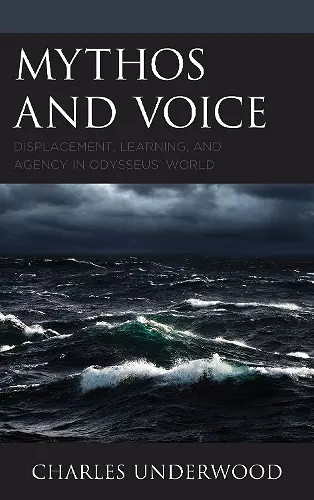Mythos and Voice
Displacement, Learning, and Agency in Odysseus' World
Format:Hardback
Publisher:Lexington Books
Published:15th Sep '18
Currently unavailable, and unfortunately no date known when it will be back
This hardback is available in another edition too:
- Paperback£37.00(9781498534260)

This book focuses on mythos and voice in the Odyssey, to illuminate its characters’ journeys from social displacement through discovery and recovery. Mythos and Voice approaches the Odyssey as a narrative of displacement – a narrative that maps the social displacement of its characters, explores the cognitive consequences of that displacement, and embodies the variable strategies by which those characters learn to resolve their displacement. It is a narrative that also employs and elaborates the characters’ own narratives of displacement as genres enabling them to resist externally imposed definitions of their situations and to redefine and ultimately reclaim their own place in the world, not as it was before their displacement, but as it must be, given the new post-heroic world in which they now live. The focus on mythos and voice enables readers to approach the study of learning and the acquisition of personal agency in the context of a hazardous world – the cultural world that Odysseus navigates in Homer’s epic poem. With this focus, the author examines interactive processes of human learning in a specific cultural context – the epic universe of Homeric narrative. By ethnographically examining the learning contexts portrayed in Homer’s epic, Mythos and Voice elucidates an Archaic Greek view of human learning through examples that show how the author(s) of the Odyssey envisioned and dramatized displacement, learning and agency in the epic work. The book focuses on aspects of Homeric cognition as they cumulatively develop among key characters within the Odyssey’s inventive narrative structure. In this way, Mythos and Voice describes a culturally specific “theory” of learning and development – a perspective that proved compelling in the pre-classical and classical Greek world, even as it does to readers now.
Mythos and Voice combines theoretical structure with close reading and exacting scholarship in near perfect balance. The concept of 'voice' in 'heroic discourse' (powerful speech) keeps the focus on the role of orality both in the making of the epic poem and in its very subject matter. The analysis of Achilles and Agamemnon conversing in Hades (Odyssey 24) is a tour de force of literary exegesis. The original adaptation of Vygotsky’s 'zone of proximal development' and Bourdieu’s 'habitus' emphasize interaction and relationalism, which place Mythos and Voice squarely amid current trends in social psychology or what the author calls 'cognitive ethnography.' -- John Paul Russo, University of Miami
From his unique perspective as a working anthropologist, drawing especially on cultural psychology, Charles Underwood has re-envisioned the Odyssey as an extended meditation on human development and situated learning. A ‘cognitive ethnography’ of archaic Greece, as well as a meticulous, passage-by passage explication, the book offers compellingly fresh insights into the figures of Telemachus, Penelope, and Odysseus as they separately and collaboratively navigate a world of dangerous social displacement. Underwood’s grasp of Homeric scholarship and range of theoretical perspectives, from Vygotsky and Bakhtin to Goffman and G.H. Mead, are impressive. The result is one of the deepest and most intriguing books about the Odyssey in years. -- Richard Martin, Anthony and Isabelle Raubitschek Professor in Classics, Stanford University
ISBN: 9781498534246
Dimensions: 231mm x 159mm x 24mm
Weight: 517g
228 pages